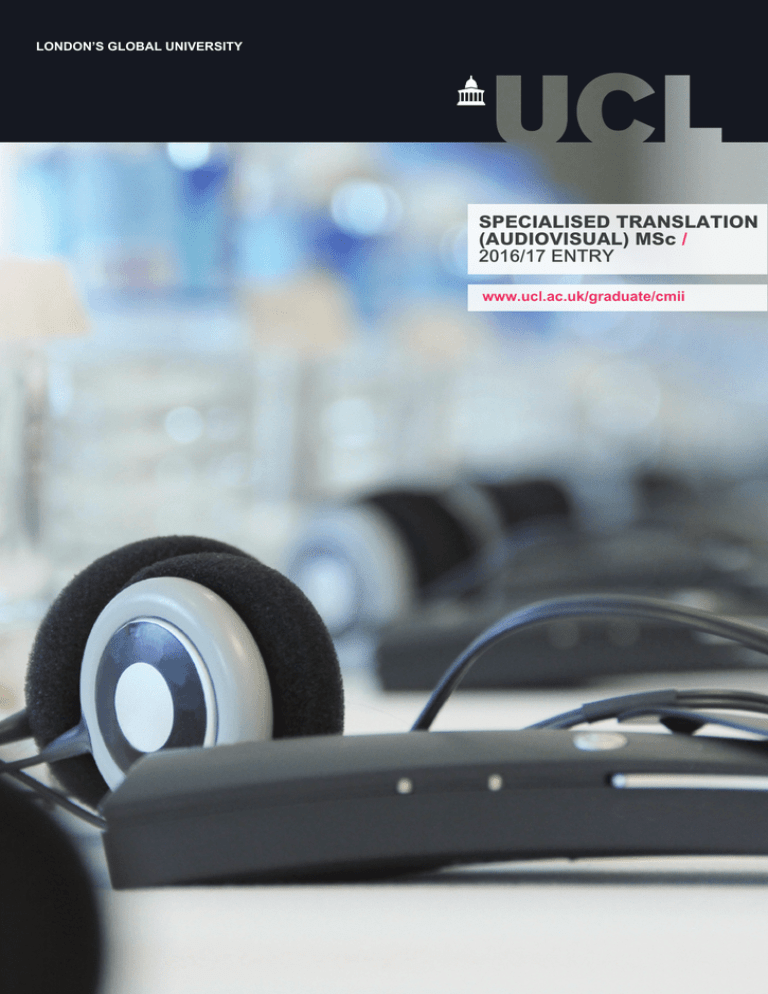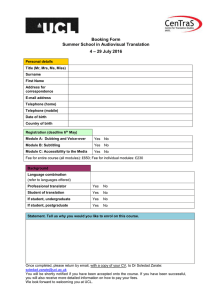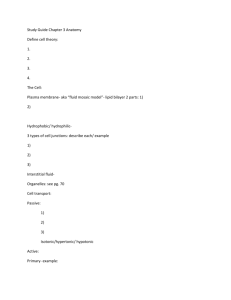SPECIALISED TRANSLATION (AUDIOVISUAL) MSc / 2016/17 ENTRY
advertisement

LONDON’S GLOBAL UNIVERSITY SPECIALISED TRANSLATION (AUDIOVISUAL) MSc / 2016/17 ENTRY www.ucl.ac.uk/graduate/cmii Specialised Translation (Audiovisual) MSc / This MSc is designed to provide first-class training in audiovisual translation and accessibility to the media. The programme offers you the opportunity to develop your translation and language skills, to deepen your understanding of the workings of language as an essential tool of communication and to gain vital experience in the rapidly developing areas of audiovisual translation and translation technology. Degree summary Degree structure Mode: Full-time: 1 year; Part-time: 2 years Students undertake modules to the value of 180 credits. The programme consists of five core modules (90 credits), two optional modules (30 credits) and a dissertation/report (60 credits). CORE MODULES // Language & Translation // Translation Technology // Accessibility to the Media // Translating for Voiceover & Dubbing // Subtitling OPTIONS By focussing on the translation of audiovisual programmes, you'll be equipped with the skills needed for professional work in the translation industry and for research in translation studies. You'll practice translation in specific language pairs and will become conversant with industry standard subtitling software and computer-based translation technology which have been transforming the way in which professional audiovisual translators work. // Located in the heart of London, UCL is excellently placed to offer opportunities for networking and to establish professional contacts. At UCL we prepare you for the professional world by performing different roles within the translation workflow, by translating a wide variety of audiovisual programmes, and by specialising in areas such as subtitling, subtitling for the deaf and the hard-of-hearing, audio description for the blind and the visually impaired, dubbing and voiceover. // We organise a wide range of activities which offer you a unique opportunity for informal contact with professional translators, translation agencies and leading academics. We also work closely with industry partners to ensure that the programme possesses the maximum professional relevance. // You will enjoy working with a team of renowned academics and professional translators, which has gained an international reputation for the quality of its teaching and research. The programme is delivered through a combination of lectures, interactive practical seminars, practical translation assignments and hands-on experience with a wide range of translation tools and technology. Assessment is carried out through essays, project work, take-home translation assessments and in-class tests. // Language & Automation // Localisation // Professional Skills for Translators // Scientific & Technical Translation // Medical Translation DISSERTATION/REPORT // All students undertake an independent research project which culminates in a dissertation of 12,000-words consisting of either an annotated translation or a critical discussion of a theoretical aspect of translation. Your career Most students find challenging and rewarding work within the translation industry on completion of the degree. Some are working as in-house and freelance translators, while others are active as project managers and translation tools experts in companies such as SDL International, Expedia, Hogarth, TransPerfect, SDI-Media, VSI and Deluxe to name but a few. In addition, the MSc is designed to serve as a basis for a Translation Studies PhD. Employability Audiovisual translation is a dynamic and rapidly developing profession, which calls for linguistically talented people with a clear understanding of the issues involved in cross-cultural transcoding and who are able to utilise the latest computer-based tools. On completion of this MSc, you will be well placed for a fast-track progression in your chosen career. We aim to make you highly attractive to employers within the translation industry and the world of audiovisual communications. In addition, the skills acquired through taking this MSc will be highly relevant if your aim is to establish yourself as a freelance translator. Entry requirements A minimum of an upper second-class Bachelor's degree in a relevant discipline from a UK university, or an overseas qualification of an equivalent standard, and proven linguistic ability in one of the language pairs available within the programme. From English into Arabic, Bulgarian, Chinese, Danish, Dutch, French, German, Greek, Hungarian, Italian, Japanese, Korean, Norwegian, Polish, Portuguese, Romanian, Russian, Spanish, Swedish, Thai, and Turkish. From French, German or Spanish into English FEES AND FUNDING // UK & EU (2016/17) entry: £9,020 (FT) // Overseas (2016/17) entry: £18,670 (FT) // UK & EU (2016/17) entry: £4,510 (PT) // Overseas (2016/17) entry: £9,285 (PT) Full details of funding opportunities can be found on the UCL Scholarships website: www.ucl.ac.uk/scholarships APPLICATION DATE All applicants: 29 July 2016 English language proficiency level CONTACT If your education has not been conducted in the English language, you will be expected to demonstrate evidence of an adequate level of English proficiency. Dr Jorge Diaz-Cintas Email: j.diaz-cintas@ucl.ac.uk The level of English language proficiency for this programme is: Standard. Telephone: +44 (0)20 7679 9363 Information about the evidence required, acceptable qualifications and test providers is provided at: www.ucl.ac.uk/graduate/english-requirements Your application Applicants considering applying for this programme with a Chinese-English language pairing should contact the convenor, Professor Jorge Diaz-Cintas (j.diaz-cintas@ucl.ac.uk), before submitting an application. When we assess your application we would like to learn: // // // // why you want to study Audiovisual Translation at graduate level // where you would like to go professionally with your degree why you want to study Audiovisual Translation at UCL what particularly attracts you to the chosen programme how your academic and professional background meets the demands of this challenging programme Details on how to apply are available on the website at: www.ucl.ac.uk/graduate/apply PDF Updated: May 25, 2016 Information correct at time of going to press. See website (www.ucl.ac.uk/multidisciplinary-and-intercultural-inquiry) for latest information




